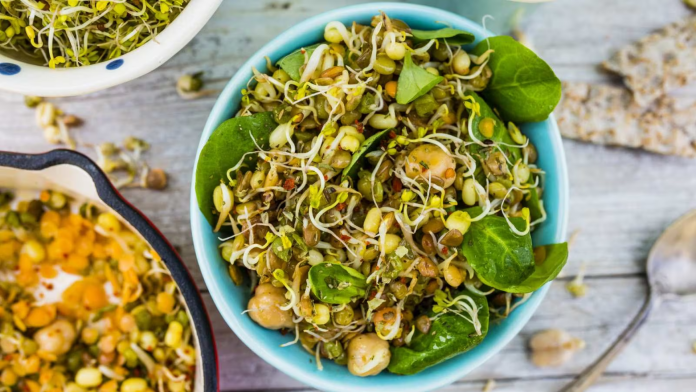When it comes to maintaining a healthy diet, incorporating sprouts has gained immense popularity due to their numerous health benefits. Sprouts are young, germinated plants that offer a concentrated source of vitamins, minerals, antioxidants, and enzymes. However, a debate persists regarding the optimal method of preparing sprouts: raw or boiled. In this article, we delve into the discussion to determine whether raw or boiled sprouts reign supreme in terms of health benefits.
Advantages of eating Raw Sprouts:
Raw sprouts are celebrated for their enzymatic activity, increased nutrient availability, and rich antioxidant content.
- Enhanced Enzyme Activity:
Raw sprouts contain enzymes that aid digestion and enhance nutrient absorption. These enzymes, such as amylase and protease, break down complex carbohydrates and proteins, respectively, facilitating easier digestion.
- Increased Nutrient Availability:
Raw sprouts are packed with essential nutrients in their natural form. Cooking sprouts may cause some loss of heat-sensitive vitamins like vitamin C and certain B vitamins, potentially reducing their availability.
- Rich in Antioxidants:
Sprouts contain high levels of antioxidants, such as flavonoids and phenolic compounds. These antioxidants protect the body against harmful free radicals, reducing the risk of chronic diseases like heart disease and cancer.
The Drawbacks of Raw Sprouts
While raw sprouts offer remarkable health benefits, there are some potential drawbacks that need to be considered.
- Potential Foodborne Illnesses:
Raw sprouts have been associated with outbreaks of bacterial infections, including Salmonella and E. coli. The warm and humid conditions during sprouting create an ideal environment for bacterial growth. Although the risk can be minimized through proper handling and sprout washing, it still poses a concern.
- Phytates and Digestive Issues:
Raw sprouts contain phytates, which can interfere with the absorption of certain minerals like zinc and iron. Additionally, the high fiber content of raw sprouts can lead to digestive discomfort for some individuals, causing bloating or gas.
- Limited Access to Certain Nutrients:
While raw sprouts offer abundant nutrients, cooking can improve access to certain others. For instance, lutein, a carotenoid essential for eye health, is more readily absorbed when sprouts are cooked.
The Benefits of Boiled Sprouts
Boiling sprouts offers unique advantages, particularly in terms of improved digestibility, reduced microbial contamination, and enhanced access to specific nutrients.
- Improved Digestibility:
Boiling sprouts softens their fibrous structure, making them easier to digest for individuals with sensitive digestive systems. This can be particularly beneficial for those who struggle with bloating or gas after consuming raw sprouts.
- Reduced Microbial Contamination:
Raw sprouts have been associated with outbreaks of foodborne illnesses due to bacterial contamination. Boiling sprouts significantly reduces the risk of such infections, making them a safer option for consumption.
- Increased Access to Certain Nutrients:
Boiling sprouts can enhance the availability of certain nutrients, such as carotenoids and lycopene. These compounds, which are found in vegetables like tomatoes and carrots, are more accessible to the body when sprouts are cooked.
The Drawbacks of Boiled Sprouts
While boiling sprouts can offer benefits, there are also some potential drawbacks that need to be considered.
- Loss of Nutrients:
Boiling sprouts can result in a loss of heat-sensitive nutrients like vitamin C and certain B vitamins. Prolonged boiling may further decrease the nutrient content, leading to potential nutritional loss.
- Reduced Enzyme Activity:
Enzymes present in raw sprouts contribute to easier digestion and nutrient absorption. Boiling sprouts can reduce or destroy these enzymes, diminishing their potential health benefits.
- Potential Flavor Loss:
Boiling sprouts may lead to flavor loss, making them less appealing to some individuals. This could reduce overall dietary enjoyment and potentially decrease the likelihood of consuming sprouts regularly.
Finding a Balance: Incorporating Both Raw and Boiled Sprouts
To reap the maximum health benefits from sprouts, it is advisable to strike a balance between raw and boiled preparations. Consuming raw sprouts occasionally can provide a boost of enzymes and antioxidants, while incorporating boiled sprouts ensures improved digestibility and reduced microbial risk.
Final Thoughts:
Both raw and boiled sprouts offer unique advantages and drawbacks. Raw sprouts boast enhanced enzyme activity, increased nutrient availability, and rich antioxidant content. However, they carry the risk of foodborne illnesses and may lead to digestive discomfort in some individuals. Boiled sprouts, on the other hand, offer improved digestibility, reduced microbial contamination, and increased access to certain nutrients. Nevertheless, boiling can result in nutrient loss and reduced enzyme activity. Finding a balance by incorporating both raw and boiled sprouts allows individuals to enjoy a wide array of health benefits while minimizing potential risks.





